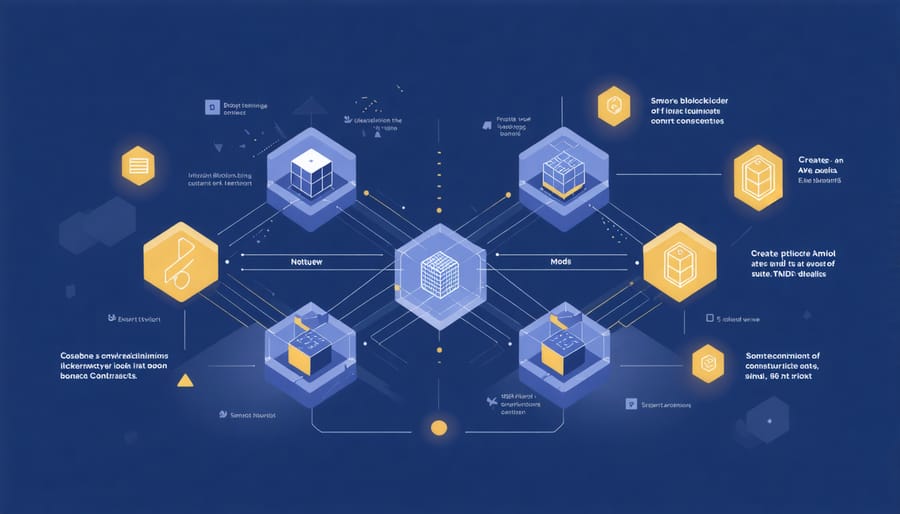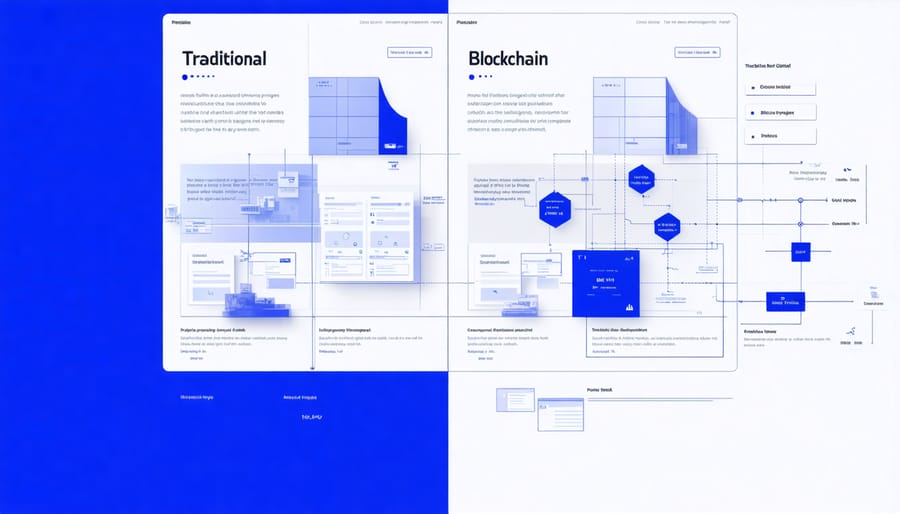Revolutionizing construction project delivery, decentralized blockchain platforms are transforming how industry stakeholders collaborate, verify, and execute complex building initiatives. These distributed ledger systems eliminate traditional intermediaries, creating an immutable record of transactions, contracts, and project milestones that enhances transparency and reduces disputes. Blockchain applications in construction have demonstrated up to 25% reduction in administrative costs while accelerating payment processing by 75%.
As construction projects become increasingly complex and globally distributed, decentralized platforms offer secure, real-time collaboration between architects, contractors, suppliers, and stakeholders across jurisdictions. Smart contracts automatically execute predetermined agreements, ensuring compliance with project specifications and regulatory requirements while maintaining an auditable trail of decisions and modifications.
Industry leaders implementing these solutions report significant improvements in supply chain management, contract administration, and quality assurance processes. By creating an unalterable record of material sourcing, certification verification, and construction sequences, blockchain technology provides the foundation for a more efficient, transparent, and accountable construction ecosystem.
How Decentralized Blockchain Platforms Work in Construction
Core Components of Construction Blockchain Networks
Construction blockchain networks operate on three fundamental components that work in harmony to ensure transparency, security, and efficiency in project delivery. At the core lies the distributed ledger technology (DLT), which maintains an immutable record of all transactions and project data across multiple nodes, eliminating single points of failure and ensuring data integrity throughout the construction lifecycle.
Smart contracts form the second critical component, serving as self-executing agreements that automatically enforce predefined rules and conditions. The smart contract implementation enables automated payments, verification of milestone completions, and streamlined procurement processes, significantly reducing administrative overhead and potential disputes.
The consensus mechanism, the third essential component, ensures all network participants agree on the validity of transactions and data entries. In construction applications, this typically utilizes Proof of Authority (PoA) or Practical Byzantine Fault Tolerance (PBFT) protocols, which are more suitable for industry-specific networks than traditional mining-based approaches.
These components work together to create a secure, efficient ecosystem for managing construction projects. The distributed nature ensures that all stakeholders have access to the same verified information, while smart contracts automate complex processes and consensus mechanisms maintain data integrity. This infrastructure supports everything from supply chain management to quality assurance protocols, forming the backbone of modern digital construction management systems.

Security and Transparency Features
Blockchain technology revolutionizes digital security in construction through its robust security and transparency features. At its core, the platform utilizes advanced cryptographic algorithms to create an immutable chain of records, ensuring that once data is recorded, it cannot be altered without detection.
Each transaction or data entry is validated through consensus mechanisms, where multiple nodes in the network must verify and agree on the information’s authenticity before it’s added to the blockchain. This distributed verification system eliminates single points of failure and significantly reduces the risk of data manipulation or unauthorized access.
The platform maintains transparency through its distributed ledger technology, where every participant has access to the same version of truth. This feature is particularly valuable in construction projects, where multiple stakeholders need real-time access to project documentation, supply chain information, and compliance records.
Smart contracts further enhance security by automating contract execution based on predefined conditions. These self-executing contracts eliminate the need for intermediaries and reduce the risk of human error or intentional manipulation. Additionally, the platform’s audit trail capabilities provide comprehensive tracking of all transactions and changes, enabling quick dispute resolution and maintaining regulatory compliance.
To protect sensitive information, the platform implements role-based access controls, allowing project managers to define specific permissions for different stakeholders while maintaining the overall transparency of the system.
Real-World Applications in Construction Projects
Supply Chain Management and Material Tracking
Blockchain technology revolutionizes supply chain management in construction by creating an immutable, transparent record of material procurement and tracking. This digital ledger system enables real-time visibility of materials from source to site, significantly reducing delays and improving project efficiency.
Construction firms implementing blockchain platforms report up to 25% reduction in material procurement delays through automated smart contracts and instant verification of deliveries. The technology creates a trusted network where suppliers, contractors, and project managers can access real-time information about material location, quality certifications, and delivery schedules.
For example, when structural steel arrives on-site, blockchain automatically records its arrival, verifies its specifications against the original order, and updates inventory levels across the entire project network. This eliminates manual documentation and reduces the risk of material shortages or overstock situations.
The platform also maintains an unalterable history of material quality certifications, testing reports, and chain of custody. This feature proves particularly valuable for projects requiring specific material grades or environmental certifications, as it prevents the use of non-compliant materials and simplifies audit processes.
Construction companies can track sustainability metrics more effectively through blockchain, monitoring the carbon footprint of materials from production to installation. This capability helps firms meet increasingly stringent environmental regulations while providing transparent reporting to stakeholders.

Smart Contract-Based Project Agreements
Smart contracts on the blockchain revolutionize traditional project agreements by automating critical processes and ensuring transparent, tamper-proof execution of contractual obligations. These self-executing contracts operate on predefined rules and conditions, automatically triggering payments and actions when specific milestones are achieved.
In construction projects, smart contracts can manage payment schedules, material deliveries, and subcontractor agreements with unprecedented efficiency. For example, when a building phase reaches completion and receives verification through IoT sensors or authorized inspections, the smart contract automatically releases payment to the relevant parties, eliminating payment delays and reducing administrative overhead.
These automated agreements particularly excel in managing complex payment structures, such as retention amounts and staged releases. The system can automatically withhold predetermined percentages for quality assurance and release them upon successful project completion, all while maintaining a permanent, auditable record of transactions.
Implementation requires careful consideration of several factors:
– Clear definition of triggering conditions and outcomes
– Integration with existing project management systems
– Establishment of reliable data input mechanisms
– Development of dispute resolution protocols
– Security measures to protect contract integrity
Recent case studies demonstrate significant improvements in payment processing times, with some projects reporting up to 80% reduction in payment-related disputes. Additionally, smart contracts provide real-time visibility into project financial status, enabling stakeholders to make informed decisions based on accurate, current data.
For optimal results, organizations should start with smaller, well-defined contract scenarios before scaling to more complex applications, ensuring smooth adoption and minimal disruption to existing workflows.
Quality Assurance and Compliance
In the construction industry, blockchain technology serves as a powerful tool for maintaining quality standards and ensuring regulatory compliance. The immutable nature of blockchain records provides an unprecedented level of transparency and accountability throughout the construction lifecycle. Every inspection, certification, and compliance document becomes part of a permanent, tamper-proof record that can be instantly verified by stakeholders.
Smart contracts automatically enforce quality control protocols by requiring specific conditions to be met before project milestones can be approved. For example, concrete pour specifications must be documented and verified before subsequent construction phases can proceed. This systematic approach reduces human error and prevents shortcuts that could compromise building safety.
The platform’s distributed ledger technology creates an audit trail that satisfies regulatory requirements across multiple jurisdictions. Building inspectors, safety officers, and compliance managers can access real-time documentation, while automated compliance checking helps identify potential violations before they become issues. This proactive approach significantly reduces the risk of costly regulatory penalties and project delays.
Furthermore, blockchain enables the creation of digital material passports that track the origin, specifications, and compliance certifications of construction materials. This feature is particularly valuable for projects requiring specific environmental certifications or safety standards. The system can automatically flag non-compliant materials and provide alerts when certifications are approaching expiration, ensuring continuous compliance throughout the project lifecycle.
Implementation Challenges and Solutions
Technical Infrastructure Requirements
Implementing a decentralized blockchain platform requires robust technical infrastructure to ensure seamless operation and data integrity. At its core, the system needs high-performance servers with sufficient processing power to handle complex cryptographic operations and maintain the distributed ledger. Organizations should invest in enterprise-grade hardware with redundant power supplies and cooling systems to prevent downtime.
Network infrastructure demands particular attention, requiring high-bandwidth connections with minimal latency to facilitate real-time synchronization across nodes. A minimum of 1Gbps dedicated network connectivity is recommended, with redundant connections for failover protection. The implementation of blockchain data security solutions necessitates robust firewalls and advanced encryption protocols.
Storage requirements vary based on project scope, but organizations should plan for substantial scalability. Initial storage needs typically range from 1TB to 10TB, with provisions for exponential growth as the blockchain expands. Solid-state drives (SSDs) are preferred for their superior read/write speeds and reliability.
Essential software components include blockchain protocol software, smart contract development frameworks, and integration middleware for existing construction management systems. Regular security audits, automated backup systems, and disaster recovery protocols should be established to maintain system integrity and ensure business continuity.

Industry Integration Strategies
Successful integration of decentralized blockchain platforms in construction requires a systematic approach focused on stakeholder engagement and phased implementation. Begin by identifying key stakeholders across the project lifecycle, including contractors, suppliers, architects, and project managers. Establish a blockchain implementation committee representing all major stakeholders to oversee the transition process.
Start with pilot projects that target specific pain points, such as supply chain management or contract administration. This allows organizations to demonstrate value while managing risks effectively. Document success metrics and ROI calculations to build stakeholder confidence and secure continued support for broader implementation.
Develop comprehensive training programs tailored to different user groups. Project managers and technical staff require in-depth understanding of blockchain operations, while site workers may need simplified interfaces focused on daily tasks. Create user-friendly documentation and provide ongoing support through designated blockchain champions within each department.
Address technical infrastructure requirements early. Ensure adequate connectivity at construction sites, establish data security protocols, and implement backup systems. Partner with experienced blockchain developers to customize solutions for construction-specific needs while maintaining industry standards compliance.
Establish clear governance structures and protocols for data sharing, smart contract execution, and dispute resolution. Create standardized procedures for onboarding new project participants and managing digital identities. Regular stakeholder feedback sessions help identify implementation challenges and necessary adjustments, ensuring continuous improvement of the system.
The integration of decentralized blockchain platforms in the construction industry represents a transformative shift in how projects are managed, documented, and executed. Through improved transparency, enhanced security, and streamlined processes, blockchain technology has demonstrated its potential to address long-standing challenges in construction project delivery.
The benefits of blockchain implementation are increasingly evident: reduced disputes through immutable record-keeping, accelerated payment processes via smart contracts, and enhanced supply chain traceability. Construction companies that have adopted blockchain solutions report significant improvements in project efficiency, with some organizations achieving up to 25% reduction in administrative overhead costs.
Looking ahead, the construction industry is poised for wider blockchain adoption as technology continues to mature and standardization efforts progress. Industry experts predict that by 2025, blockchain will become a standard component of digital transformation strategies in construction, particularly in areas such as BIM integration, automated compliance verification, and sustainable material tracking.
For construction professionals considering blockchain implementation, the path forward requires careful planning, stakeholder buy-in, and a phased approach to adoption. While challenges remain, including initial implementation costs and the need for industry-wide standards, the potential benefits far outweigh the obstacles. As more success stories emerge and technology costs decrease, blockchain is set to become an integral part of construction’s digital future, driving innovation and efficiency across the sector.

